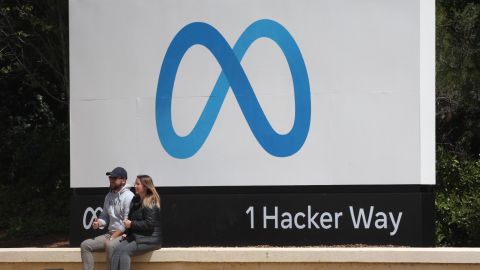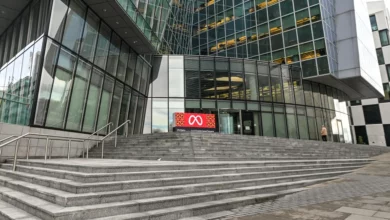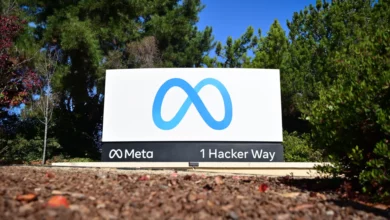
CNN – Even by Facebook’s standards, 2021 was a rough year.
A series of damning reports based on leaks from a whistleblower raised uncomfortable questions about Facebook’s impact on society; the company continued reeling from concerns about the use of its platform to organize the January 6 Capitol riot; and privacy changes from Apple threatened its core advertising business. Meanwhile, young users were flocking to TikTok.
At a virtual reality event on October 28, 2021, CEO Mark Zuckerberg tried to turn the page. Zuckerberg announced that Facebook would change its name to Meta and go all in on building a future version of the internet called the “metaverse,” proving to all in the process that the company he launched in 2004 was more than just a social media business.
One year and billions of dollars later, the so-called metaverse still feels years away, if it ever manifests at all. And the company formerly known as Facebook remains very much a social media business — one that is facing more financial pressure than when it announced the change.

Meta’s Quest 2 consumer virtual-reality headset, released two years ago, is popular in its category but remains a niche product overall. Its newest headset, the much pricier $1,500 Quest Pro, is intended for enterprise customers and likely won’t move the needle with everyday consumers. And Meta’s flagship social VR app Horizon Worlds can feel like a ghost town (albeit a ghost town with laser tag).
While some brands have since made measured bets on the metaverse, including by hiring “chief metaverse officers,” it’s not clear whether consumers actually want to work or play in it, or even know what the hard-to-define term means. The metaverse refers, generally, to a sort of virtual world that people can walk around in, as well as the idea of making the internet more ubiquitous and interconnected.
Meanwhile, Meta’s core business is contracting as it confronts growing competition from TikTok and an advertising industry in retreat amid looming recession fears. The company this week reported its second-ever quarterly drop in revenue and saw profit cut in half from the prior year. It’s selling more ads but making less money on them, and user growth on its social media platforms is slowing. After hitting a $1 trillion market cap for the first time last summer, it’s now worth about a quarter of that, or less than Home Depot.
“The business is not growing in 2022,” said Gil Luria, technology strategist at D.A. Davidson. “There is expectation that it will grow going forward, but that expectation may prove to be optimistic.”
A bet that looked bold a year ago now looks borderline unhinged. Meta lost $9.4 billion in the first nine months of 2022 on its metaverse efforts and expects losses from the unit to “grow significantly year-over-year” in 2023. This has prompted even some of Meta’s supporters to urge it to rethink its strategy shift, and possibly slow it down. (It also prompted a tearful Jim Cramer, host of “Mad Money,” to apologize to viewers for trusting Meta’s management team and recommending that investors buy the stock.)
“People are confused by what the metaverse even means. If the company were investing $1-2B per year into this project, then that confusion might not even be a problem. You would simply do R&D quietly and investors would focus on the core business,” Brad Gerstner, CEO of Altimeter Capital, a shareholder in Meta, wrote in an open letter to Zuckerberg this week. He urged Meta to “cap its metaverse investments to no more than $5B per year with more discrete targets and measures of success.”
The current pace of spending, he added, “is super-sized and terrifying, even by Silicon Valley standards.”
Meta did not respond to requests for comment on this story.
A sudden shift years in the making
Though the name change was just announced a year ago, the shift from Facebook to Meta has been years in the making. Zuckerberg has said in the past that it’s a long-term bet for the company — not an overnight transformation. It began with Facebook’s 2014 purchase of Oculus VR, and in the years since, the company has rolled out a series of headsets that are increasingly capable, affordable and portable.
Meta’s latest headset, the Quest Pro, is its first effort at combining the immersiveness of VR with the real world. It can display text and fine details in VR, track your eyes and facial features to give you a sense of connection with other people in virtual spaces, and show you a view of the world around you in color while letting you interact with digital objects — all nods toward Meta’s goal of attracting more business users.
It’s a far cry from the Oculus Rift headset available in 2016: That cost $599, but users also had to connect it to a powerful PC and use it with a sensor camera on a stand that tracked the headset. At first, that headset didn’t even come with tracked hand controllers; it initially shipped to customers with an Xbox controller and a small handheld remote.
Although the headsets have improved dramatically, VR and AR are still nascent technologies searching for purpose and popularity. The VR headset market is still tiny compared to, say, an established gadget market like console video games. ABI Research expects 11.1 million VR headsets will ship out this year, about 70% of which it predicts will be Quest 2 headsets. That’s a drop from its estimate of 14.5 million headsets in 2021, of which Quest 2 headsets made up 85% of the total.
There’s potential for these products, some technology experts say, including in the workplace, but in the near term its adoption by everyday users remains uncertain at best.
“I’m not sure this is going to translate to end-user consumers any time soon,” said David Lindlbauer, an assistant professor at Carnegie Mellon University who leads the school’s Augmented Perception Lab. (Meta is sponsoring Lindlbauer’s research into developing advanced user interfaces for AR and VR.)
A headset is not a smartphone
For Zuckerberg, and Meta, that creates a unique challenge.
Zuckerberg successfully pivoted Facebook’s operations once before from desktop to mobile devices shortly after taking the company public, a move that helped supercharge its advertising business and ensure its dominance for much of the next decade. But smartphones were already ubiquitous at that time; if anything Facebook was a bit late.
Now, the company is trying to spearhead a new technology and hoping consumers will follow its lead.
Meta has positioned the shift as a sort of existential imperative for the company. After Apple’s app tracking changes hurt Meta’s ability to target ads to its users, the company doesn’t want to rely on any outside hardware or app store in the future.

But there’s a big difference between looking at a computer or smartphone display and wearing a headset. While Lindlbauer can imagine using a headset for perhaps an hour a day, alternating between immersive views in VR and digital imagery that mixes with the physical world, “I think we haven’t hit the sweet spot yet of something I want to wear all day,” he said.
Meta is also facing an enormous challenge when it comes to showing off VR content that users like the looks of and want to use repeatedly. According to a recent report in The Wall Street Journal, internal documents show Horizon Worlds has fewer than 200,000 active monthly users, a rounding error for a company with 3.7 billion monthly active users across its various services. (A Meta spokesperson told the Journal that it’s “easy to be a cynic about the metaverse” but Meta thinks it is “the future of computing.”)
“They’re starting with this idea that they want to build one big space like Horizon Worlds in which everybody’s just going to show up and start building stuff,” said Avi Bar-Zeev, founder of AR and VR consultancy RealityPrime and a former employee at Apple, Amazon and Microsoft, where he worked on the HoloLens VR headset. “There’s no virtual world that was ever successful building a canvas that people would just come and start painting.”
Zuckerberg has personally received intense criticism for the way Meta envisions work and play interactions in virtual spaces after posting on Facebook an image of his blocky, cartoon-like avatar in Horizon Worlds — an image he later admitted was “pretty basic.”
“As far as the quick-twitch, give-me-more public is concerned, the progress seen so far is a letdown,” said Janna Anderson, director of the Imagining the Internet Center at Elon University. “Meta is suffering tremendous ridicule in social media and in the overall public zeitgeist.”
The Quest Pro’s face-tracking capabilities can help make avatars’ facial expressions look more realistic: Initially, users can access this tracking in Horizon Worlds and Horizon Workrooms, Meta said, as well as in several developers’ apps such as Painting VR and DJ app Tribe XR.
But even with facial tracking, what users see when they pop in to Horizon Worlds — blocky, human-like avatars that exist only from the torso up, floating around a virtual plaza — will for now continue to contrast sharply with the image Zuckerberg portrayed during Meta’s Connect event on October 11 of his own full-body avatar.
In the meantime, investors appear to be getting fed up with the investments in the metaverse at a time when the future of its core business is also deeply uncertain.
“I think kind of summing up how investors are feeling right now is that there are just too many experimental bets versus proven bets on the core,” Jeffries analyst Brent Thill said on Meta’s earnings call this week.
Zuckerberg, for his part, is defending the strategy shift. “I’d say that there’s a difference between something being experimental and not knowing how good it’s going to end up being,” he responded. Separately, he added: “I think people are going to look back decades from now and talk about the importance of the work that was done here.”




